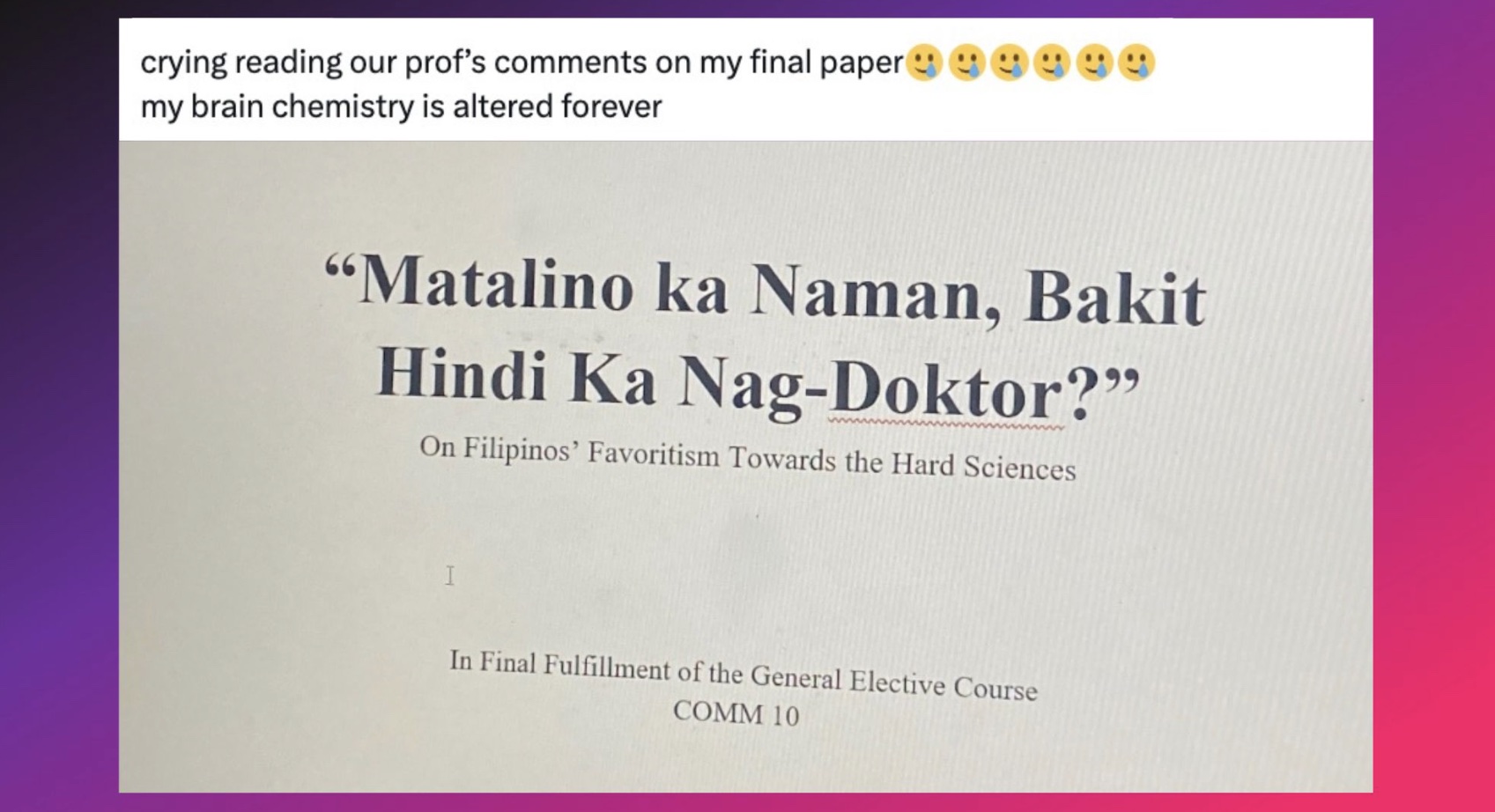In light of the economic hurdles confronting numerous families in the Philippines, it’s common for parents to start meticulously planning the life they envision for their children from the moment they enter the world.
For instance, many children are introduced to English early on due to the perception that fluency in this language will provide them with more opportunities in the future. Parents prioritize this even if it means their children have little to no understanding of their supposed mother tongue, Filipino. As long as their children are successful, parents are willing to do whatever it takes.
Thinking that this is probably way too extreme, the same thing also applies when it is time for their children to enter college. As these children grow, parents will go to great lengths to ensure they receive a quality education, believing it will make it easier for them to pursue careers in fields such as medicine, engineering, or finance, which often offer high salaries.
As unfortunate as it may sound, seemingly like a story one would only encounter in an afternoon drama, many young Filipino adults have experienced this firsthand, feeling pressured to pursue professions that promise financial stability and prestige.
In fact, this narrative was just recently reinforced through the journey of Angel Vi. E Manong, whose final paper for her general elective course COMM 10 went viral online. On Sunday, June 9, Manong shared on her X (formerly known as Twitter) account a screenshot of her work entitled, “Matalino ka Naman, Bakit Hindi Ka Nag-Doktor? [You’re intelligent, so why didn’t you become a doctor?”
Accompanying the post was a screenshot of her professor’s comment, which included a particularly resonant statement: “As you make yourself a successful scientist, I hope that you do not forget that you are also born an artist first.” This was also the caption she used in her post.
“As you make yourself as a successful scientist, I hope that you do not forget that you are also born an artist first. :)”
crying reading our prof’s comments on my final paper🥲🥲🥲🥲🥲🥲 my brain chemistry is altered forever pic.twitter.com/QaBoCGWf0C
— bee (@gelbi_) June 9, 2024
The paper, now shared on the same platform due to popular demand, delves deep into Filipinos’ culture of favoring jobs that “make money” and the factors contributing to such a mindset. In it, Angel also shared her personal experience of having to choose a science degree despite dreaming of becoming an artist since elementary school due to concerns about not earning enough in the future if she followed her passion.
“I wanted to be a children’s book author and illustrator. I learned that there was a college course for creative writing, so I was sure that I would be taking it in the future,” she wrote.
“But growing up, I was constantly being told that pursuing the arts will not be able to support me enough financially.”
Given these circumstances, the harsh reality that many Filipino workers barely make ends meet pushes students into careers they never intended to pursue. No matter how hard it is to admit, some careers do indeed make reaching the conventional type of success more possible.
Now, is there something wrong with this?
Honestly, there is nothing inherently negative about high-paying jobs because they do offer economic security in a country where it is sorely needed. Aside from that, they are also honorable professions that every community requires.
However, an issue arises when society places a higher value on professions in fields like engineering or medicine as if they are superior compared with career paths in liberal arts and humanities. While the roles of engineers or doctors are undoubtedly vital, it’s crucial to recognize as well the equally significant contributions artists make to the world.
Moreover, it’s concerning to note that many established organizations in the country primarily offer scholarships exclusively for disciplines within Science, Technology, Engineering, and Mathematics (STEM). Angela Manong’s paper also addresses this concern.
With this prevalent trend, one is compelled to question: What about those aspiring to pursue degrees in the arts but lacking the necessary resources? Should they merely abandon their dreams and choose paths where “success” appears more guaranteed? Or perhaps a more pertinent question is: Is life meant to be just about earning money?
It goes without saying that money is needed to avoid a life where one “barely” survives. As depicted in the film “The Hows of Us,” wherein Kathryn Bernardo’s character admonishes Primo, a frustrated musician portrayed by Daniel Padilla, “Ano puro passion na lang? Lintek na passion na ‘yan, hindi tayo mapapakain ng passion na ‘yan [Is it all just about passion? Damn that passion, we can’t feed ourselves with that passion].” It’s evident that life isn’t as straightforward as we’d like, where everything aligns perfectly just by fighting for what we want.
Yet, while this harsh reality persists, we cannot dismiss the pursuit of artistic endeavors solely for the sake of achieving societal notions of success. Success, after all, is subjective. Some find fulfillment in material wealth, while others derive joy from pursuing their dreams—be it through photography, music, or poetry.
It is also not productive to shame those who follow their aspirations because, believe it or not, society has already done enough to make them realize that there are only a few artists who have made it compared to the many testimonies of those who chose a more “practical” path.
Instead, what we can do is collaborate and strive for a society that provides equal opportunities for all pursuits, be they artistic or pragmatic. This includes advocating for improved resources and support systems, such as scholarships, financial aid, mentorship programs, and community initiatives, ultimately cultivating an environment free from biases against artistic vocations.
But until this remains ideal, those who are forced to sacrifice their dreams for careers seemingly guaranteeing stability for a typical Filipino family may not need to completely turn their backs on their love for arts just like the author of the comprehensive paper, Angel Manong.
Angel Manong is now pursuing a Bachelor of Arts in Agricultural Biotechnology as her undergraduate degree in University of the Philippines Los Baños. According to her, despite being different from her initial plan, this choice allowed her to stay connected to her passion for art by being close to nature.
Other POP! stories that you might like:
[Commentary] The Absolute Divorce Bill isn’t the absolute evil you think it is
Influencer faces backlash for claiming husband ‘hired’ HPG Escort to avoid heavy traffic
Proud ‘Bloom’ shares letters handwritten by BINI which were won at an auction
PH volleyball player Sisi Rondina’s comment on SB19 draws mixed reactions from fans



